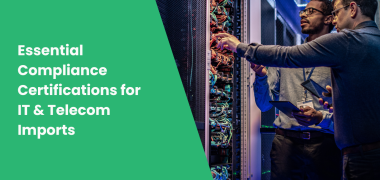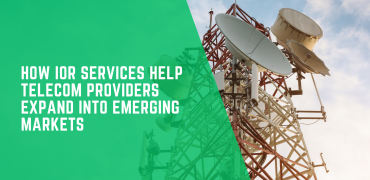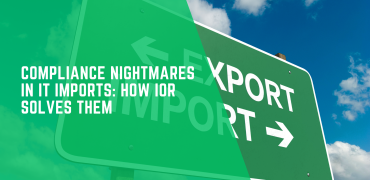In today’s interconnected world, the global demand for IT and telecommunications equipment is at an all-time high, driven by the exponential growth of digital transformation and telecommunications infrastructure. To meet this demand, IT and telecom companies are importing equipment from a wide range of international suppliers. However, navigating the complex regulatory landscape of compliance certifications in various countries can be challenging. Meeting these compliance standards is essential for a smooth import process and ensures that equipment is safe, secure, and legally compliant.
This blog post will explore the key compliance certifications required for IT and telecom equipment imports and highlight the critical role that Importer of Record (IOR) services play in helping companies manage these complex regulatory requirements.
Why Compliance Certifications Are Crucial for IT & Telecom Imports
Compliance certifications for IT and telecom imports serve multiple purposes:
- Regulatory Compliance: Governments around the world enforce compliance standards to ensure that imported products meet local laws and regulations. Importing non-compliant products can result in fines, legal issues, or shipment rejections.
- Product Safety: Certifications help verify that products adhere to safety guidelines, reducing the risk of hazards associated with improper equipment.
- Data Security: In the age of digital technology, data privacy and cybersecurity are paramount. Certifications confirm that imported IT and telecom equipment meets stringent standards for data security, minimizing risks related to breaches or data theft.
- Market Access: Meeting compliance standards is often a prerequisite for entering new markets. Without the appropriate certifications, companies may face barriers to selling or deploying their products in certain countries.
Given these factors, obtaining the necessary certifications is crucial for IT and telecom companies looking to import equipment smoothly and establish a reliable presence in global markets.
Key Compliance Certifications for IT & Telecom Imports
The types of certifications required vary by country and depend on the nature of the equipment being imported. Here are some of the most common and critical certifications that IT and telecom equipment importers may need to consider:
1. CE Mark (Conformité Européenne)
- Region: European Union (EU)
- Purpose: The CE mark certifies that a product meets EU safety, health, and environmental protection standards.
- Applicability: Required for IT and telecom equipment entering the EU market.
- IOR Assistance: An IOR can assist in obtaining CE marking by ensuring that products meet EU standards, handling documentation, and managing testing if necessary.
2. FCC Certification (Federal Communications Commission)
- Region: United States
- Purpose: FCC certification ensures that electronic devices emitting radio frequencies do not interfere with other devices and comply with U.S. standards.
- Applicability: Required for telecom equipment and IT products with wireless or Bluetooth capabilities.
- IOR Assistance: IOR services can facilitate the certification process by coordinating with certified labs, managing paperwork, and ensuring products meet FCC requirements.
3. RoHS (Restriction of Hazardous Substances)
- Region: European Union, with similar standards globally
- Purpose: RoHS compliance limits the use of specific hazardous materials in electronic equipment.
- Applicability: Mandatory for most electronic equipment in the EU and widely adopted in other markets.
- IOR Assistance: An IOR can verify product compliance with RoHS standards, ensuring that imported equipment does not exceed permissible levels of hazardous substances.
4. REACH (Registration, Evaluation, Authorisation, and Restriction of Chemicals)
- Region: European Union
- Purpose: REACH regulates chemicals used in products sold within the EU.
- Applicability: Applies to IT equipment that may contain regulated chemicals.
- IOR Assistance: IOR services can handle REACH documentation and registration requirements, streamlining the process for companies that are not established in the EU.
5. ANATEL Certification (Agência Nacional de Telecomunicações)
- Region: Brazil
- Purpose: ANATEL certification ensures that telecom equipment meets Brazil’s regulatory standards.
- Applicability: Required for all telecommunications products imported into Brazil.
- IOR Assistance: An IOR with local expertise can facilitate the ANATEL certification process, providing in-country representation and managing complex regulatory requirements.
6. CCC Mark (China Compulsory Certification)
- Region: China
- Purpose: The CCC mark certifies that products meet Chinese quality and safety standards.
- Applicability: Required for telecom and IT equipment entering China’s market.
- IOR Assistance: IORs help manage the CCC application process, working with local certification bodies and handling regulatory paperwork to ensure seamless entry into China.
7. UL Certification (Underwriters Laboratories)
- Region: Primarily North America
- Purpose: UL certification confirms that electrical equipment meets safety standards.
- Applicability: Commonly required for IT and telecom equipment in the United States and Canada.
- IOR Assistance: IORs can coordinate testing with UL-certified labs, manage documentation, and ensure that equipment meets safety standards, facilitating compliance for North American imports.
8. TEC Certification (Telecommunication Engineering Center)
- Region: India
- Purpose: TEC certification is mandatory for telecom equipment used in public networks within India.
- Applicability: Required for most telecom equipment imports into India.
- IOR Assistance: An IOR with Indian market expertise can help obtain TEC certification, handle the extensive regulatory requirements, and streamline the entry process.
How Importer of Record (IOR) Services Assist with Compliance Certifications
Managing compliance certifications across different countries can be complex and time-consuming. Importer of Record (IOR) services are specifically designed to handle these regulatory burdens on behalf of IT and telecom companies, providing several advantages:
1. Ensuring Regulatory Compliance Across Borders
- IORs have a deep understanding of local regulations, including the specific certifications required for each product category and market.
- By working with an IOR, companies can rest assured that their imports meet all necessary compliance standards, reducing the risk of shipment delays, fines, or even product rejections.
2. Streamlining Documentation and Certification Processes
- Certification processes often involve extensive paperwork, documentation, and communication with regulatory bodies.
- An IOR manages these administrative tasks, from preparing documentation and submitting applications to coordinating with local authorities. This ensures that all paperwork is completed accurately and on time, simplifying the certification process.
3. Providing Local Representation in Foreign Markets
- Many countries require a local entity or representative to manage import processes and certification. IOR services fulfill this role, acting as the official importer and representative for foreign companies.
- By serving as the local entity, IORs can facilitate communication with regulatory agencies, manage local testing requirements, and handle any issues that may arise during the certification process.
4. Coordinating with Certified Testing Laboratories
- Many certifications, such as CE and FCC, require testing by certified laboratories. IORs often have established relationships with certified labs and can manage testing on behalf of their clients.
- This coordination ensures that products are tested and certified according to regulatory standards, expediting the approval process.
5. Navigating Complex Customs and Import Regulations
- Customs regulations vary widely between countries, and failing to meet them can result in costly delays. IORs specialize in navigating these regulations, ensuring that all certifications are in place before products reach customs.
- With their expertise, IORs can prevent delays by proactively addressing regulatory requirements and providing all necessary documentation to customs authorities.
6. Supporting Data Security and Compliance for Sensitive Equipment
- Data security is paramount for IT and telecom equipment, particularly when dealing with products that handle sensitive information.
- IORs are well-versed in data security compliance requirements and can help companies meet cybersecurity standards, protecting sensitive data and reducing the risk of breaches.
7. Assisting with Product Registration and Market Access
- IORs provide support with the initial registration of new products in foreign markets, helping companies gain market access efficiently.
- This service is especially valuable for companies entering new regions, as it ensures compliance with all local standards, from product labeling and packaging to environmental certifications.
The Bottom Line: How IOR Services Enable Seamless IT & Telecom Imports
Compliance with international certifications is a critical part of global expansion for IT and telecom companies. Managing these certifications, however, can be a significant administrative and logistical burden, especially when companies are unfamiliar with foreign regulations. By partnering with a reliable Importer of Record service, companies can streamline the certification process, ensuring that their products meet all regulatory standards and are ready for import.
IOR services offer an invaluable bridge between global markets and local regulatory requirements, allowing IT and telecom companies to focus on their core business while leaving the complexities of compliance to the experts. Whether it’s handling CE marking in Europe, FCC certification in the U.S., or ANATEL approval in Brazil, IOR services make global expansion simpler, safer, and more efficient.
For IT and telecom companies looking to expand their footprint, investing in an IOR partner can be a game-changer. With compliance certifications managed efficiently, companies can ensure seamless imports, safeguard their reputation, and ultimately deliver products to their customers faster and with greater confidence.




